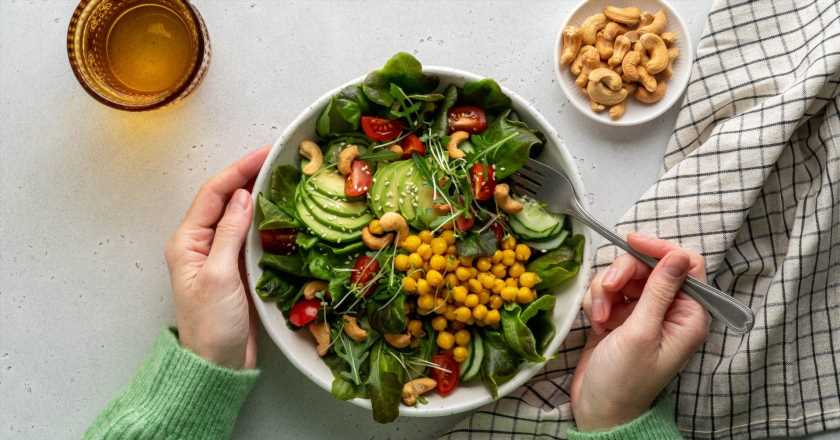The ‘fibre paradox’ explains why nutritious foods make you bloated
If beans are so good for your gut, why do they cause gas and bloating?
Remember that rhyme you used to sing as you opened a tin of Heinz? “Beans, beans, good for the heart, the more you eat the more you fart…” Well, that’s not just a joke from school – beans and legumes can cause bloating, gas and discomfort for a lot of people.
So the fact that these fibrous foods are often heralded as one of the healthiest things you can eat might ring alarm bells for anyone struggling with digestion and gas.
That’s the “fibre paradox”, a concept coined by Dr Will Bulsiewicz (known as Dr B) to explain how something so good for you can make you feel so bad.
You may also like
Why Instagram posts trying to ‘normalise’ bloating are fuelling comparison
Talking on the Food Medic podcast by Dr Hazel Wallace, he said: “The issue with the consumption of fibre is that people who have the most damaged guts are going to struggle with dietary fibre… but that this is what you actually need to heal and optimise your gut.”
To explain why, Dr B said that humans don’t have the capacity to break down fibre. “Let’s just say we’re eating a salad with a variety of different plants that have fibre as a part of them. You chew it, swallow it, goes down, but [the fibre] that is actually going to pass through your oesophagus, stomach and small intestine is going to be completely unchanged. The reason why is because we as humans actually lack the enzymes necessary to break down and process fibre,” he says.
Instead, it is our microbiome that processes fibre. “In fact, they’re more well designed than we are to process and digest fibre because they’re so adaptable.

“Fibre is actually metabolised by these microbes, and in doing that they are releasing anti-inflammatory molecules… short-chain fatty acids,” says Dr B.
There are countless studies that show fibre is one of the most important things we can eat to protect us from cancer, heart disease, stroke and other illnesses. The main reason for that is because of these short-chain fatty acids they produce when they are broken down.
“The fibre paradox is that if we want to ‘heal’ our [gut] and you’re a person who struggles with digestion… you need these short-chain fatty acids. But given we are 100% dependent on the gut microbes to create them for us, what happens if gut microbes are not in a good place?” asks Dr B. The answer: you’ll be in even more discomfort.
You may also like
Leaky gut syndrome: is your gut lining really a problem?
The good news is that, because your microbiome is so adaptable, you can improve your gut bacteria to better digest foods. Your first port of call when suffering from digestive issues should always be your doctor to rule out other health concerns, but when you’ve done that Dr B says you can use his GROWH method to support your microbiome.
The GROWH method for gut health
Genesis
“Genesis is the first step in healing in all cases,” says Dr B. “The first step has to always be finding out whatwe are trying to treat. Don’t start with how many plants you’re eating, start with figuring out what you are trying to fix.”
Restrict, Observe and Work back in
“There’s no reliable blood test, or poop test, or any sort of tests to tell us which foods we should and should not eat in terms of food intolerances, so we need a temporary elimination diet [to figure out our triggers],” says Dr B.
Restriction can not exist without observation or working back in, warns Dr B. “The idea here is very simple. Find the foods you struggle with and reduce the amount. Start low and then go slow to escalate the amount of food over the course of time. Your body will become adapted to it much like exercise.

“If you go to the gym and you haven’t been working out, you don’t start with the heaviest weight. Start with the lightest weight and find out how much you’re capable of, and then increase it from there. Every time you challenge your body, your body steps up and adapts to the challenge – it becomes more capable. Your gut is no different.”
Working back in is so important because diversity is key to a healthy microbiome. “Every single plant is unique and has unique things to add to your gut health,” says Dr B.
“When we reduce the variety in our diet, such as going low FODMAP and staying low FODMAP or going gluten-free and staying gluten-free [outside of those with an allergy], unfortunately, what we see in our microbiome studies consistently is that you are actually causing injury or harm to the microbiome.”
Holistic healing
Finally, the H. “This is my friendly reminder that this is not just biochemistry. You are not just digestive enzymes meeting carbohydrates, proteins and fats. We are complex human beings and our environment and how we feel affect our digestion too. Holistic healing means going beyond the digestive system and looking at the whole person to understand how to properly heal,” he explains.
You may also like
Are psychobiotics the final key to linking gut health and mental health?
That’s so important given the link between our brain and our gut. Feeling anxious or stressed about eating will only exacerbate symptoms, so working on your relationship with food is crucial. And remember that you should always talk to a doctor if you have any symptoms of poor gut health, including bloating, constipation, diarrhoea and gas.
Images: Getty
Source: Read Full Article
